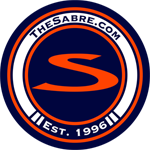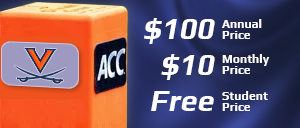 |
|
Ari Dimas scored the Hoos’ lone goal in the 1-0 victory. (Photo courtesy of Ian Rogol) |
As the Virginia men’s soccer team protected a one-goal lead for the final 43:53 of its third-round NCAA Tournament game Sunday afternoon, the Cavaliers found themselves on their heels. Virginia possession was rare. Portland peppered Virginia’s attacking third with long, direct balls, and the Hoos fought with an incoming wind, sun in their faces, and a capable Portland attack to keep the Pilots scoreless.
But, such is the way the Hoos have played in their 12-game unbeaten streak – a “grind,” as Virginia coach George Gelnovatch puts it. Even as Portland outshot UVa 10-4 in the second half, a Cavalier goal barely a minute into the period by freshman Ari Dimas gave the Hoos the advantage, and some typically big saves from goalkeeper Diego Restrepo kept them in control. The Cavaliers moved onto the round of eight with a narrow 1-0 victory against Portland, earning a chance to advance to the College Cup with another victory.
“When you’re winning 1-0, and it’s the last 20 minutes of any big game, and you’ve got the wind in your face, and the other team’s being direct,” Gelnovatch said, “you get a grind, which is what we did.”
The start of Virginia’s “grind” followed Dimas’ goal, which was the culmination of a strong offensive showing by UVa to that point in the game. Midfielder Tony Tchani first played a beautiful ball through to right back Shawn Barry, who made a well-timed run into the attacking third. Receiving the ball at the corner of the box near the end line, Barry played the ball on the ground past a sliding Portland defender, reaching the foot of Dimas. As Portland goalkeeper Austin Guerrero slid across the goal to the near post, Dimas redirected the ball to the back post, but it rolled precariously slowly toward the goal line. A Portland defender attempted to clear the ball off the line, but the shot had just enough oomph to enter the goal by less than a yard – a raise of the linesman’s flag signaled that Virginia took a 1-0 advantage.
“I knew [the ball] had to be coming out to me,” Barry said, “because we work on that at practice – it goes in, and it goes out to an outside back. So I just started my run, and then [Tchani] put it perfectly, right in my path, and I just touched it across.”
“It was a big booster coming into the second half,” Dimas said. “It definitely pumped us up.”
A Cavalier defender wreaking havoc in the attacking third has been a theme for Virginia of late. Barry’s assist of Dimas was one of two he could have had on the day, as a would-be Neil Barlow goal on a similar ball from Barry in the first half was called back. A week ago, left back Hunter Jumper moved into the attack to earn his first goal of the season in a 5-0 win against Bucknell; the week before that, Jumper assisted forward Will Bates’ game-winning goal in the ACC Championship.
“We talked about that at halftime [against Portland],” Gelnovatch said. “I told Shawn, and Hunter, ‘I need you guys to continue to make those runs – I know it’s 45 minutes into the game, I know we have the wind in our face.’ And [on the goal], Tony put the ball on the money, and Shawn put a great ball across.”
“Since we can keep the ball more, we can attack more,” Barry said. “When they switch the ball, they [the coaches] tell us to start moving up, and that’s what we do, and we get to attack and put in good balls. That’s how we score sometimes.”
Making runs into the attacking third is a fun but tiring expedition, Barry said, although he has the knowledge that another player – usually the same-side outside midfielder – will cover his spot.
“It can get tiring,” Barry said, “so you’ve just got to know when to pick and choose, when to go.”
Even with an outside midfielder covering, moving a back into the attacking third can be a risk, since the outside midfielder is obviously not as capable of a defender. But, if Virginia’s shutout streak is any indication, the Cavalier defense can handle it.
“Our whole defense is solid, so if we get forward, there’s always someone coming in for us, sliding in, and then we don’t have to do that much running to get back,” Barry said. “We just slide in for them where they were.”
 |
|
Will Bates and the Cavaliers host Maryland on Friday at 7 p.m. (Photo courtesy of Ian Rogol) |
The first chance that Barry created came 15 minutes into the match. Barry received a pass and flew down the sideline before playing a driven ball on the ground across the top of the six. The ball reached the foot of Barlow on the back post and he easily finished a one-time shot – the linesman, however, called Barlow offside.
The ball was only played roughly 10 yards forward, so a sprinting Barlow could only have been barely ahead of the ball to start with for him to be offside. Furthermore, Barlow appeared to move behind the defender just after Barry had played his ball. But, the linesman’s word was final, and the score stood at 0-0.
“I put it straight across,” Barry said. “I don’t know how somebody’s offside when I put it straight across.”
And that wasn’t the only chance that Virginia created in the first half. In the 37th minute, Barlow took a crack at goal with his right foot from 30 yards, and drilled a wicked shot that curved toward the back post and skipped off the ground at an awkward distance for Guerrero; the goalie’s diving reaction save to his left was perhaps his best save of the match. In the 41st minute, both Dimas and Tchani had opportunities inside the 18; Dimas’ shot was shanked across to Tchani, whose shot was blocked on an empty net.
“In the first half, I felt like in the final third of the field, I thought we were excellent,” Gelnovatch said. “I felt like we scored a goal [on the offside], and I felt like we could’ve gotten a second goal.”
Even as the Cavaliers earned fair share of chances in the first half, however, they were fortunate to avoid giving up a goal themselves. The best chance for the Pilots came in the 37th minute. Dimas was beaten on the sideline by a Portland attacker, who cut the ball back toward the penalty spot to unmarked forward Ryan Luke. Just 10 yards from goal, Luke got off an unchallenged shot on Restrepo, but it was not Luke’s best effort – the right-footed shot was hit at head-level and without much pace, and went to the same side as Restrepo’s movement across the goal, against how forwards are traditionally taught. Nevertheless, Restrepo was forced to make an outstanding diving save to his left, batting the ball away for a corner to keep the game scoreless.
Portland had its first outstanding chance less than five minutes into the game, but it was spoiled by a poor first touch. With Portland in a numbers advantage and on a counter attack, a Pilot midfielder sailed a perfect ball to the backside of the 18 to an unmarked attacker. A solid first touch would have opened up a clean look on goal from 12 yards away; the forward’s touch was too strong, though, allowing the Virginia defense to recover and shut down the opportunity.
It was with Virginia going against the wind and with the sun in its face in the second half, however, when the Cavaliers were tested with the greatest frequency. Whether it was on a driven punt from Guerrero or a penetrating long ball from the Portland back line, the Pilots went after the Virginia back four again and again, and found several opportunities on which Restrepo came to the rescue. The best the Cavaliers could do was clear the ball out of danger to Bates or, for the last eight minutes, fellow forward Brian Ownby playing alone up top; though Virginia’s forwards were able to create two excellent scoring chances, Virginia spent most of its time giving the ball right back to the Portland back line and preparing for another attacking onslaught.
“With the wind, they became very direct, and to their credit, they were very good at it,” Gelnovatch said. “Just putting balls in behind us that carried into the wind, that had us twisting and turning and tough to deal with, and what we did not do well enough in the second half was be able to keep it and control the rhythm a little bit.”
The best opportunity for the Pilots came in the 64th minute – also using their outside backs in the attack, Portland defender Ryan Kawulok received a well-timed through ball into the box. Restrepo cut down the angle and met Kawulok on the right side; Restrepo committed to a dive just as Kawulok hit a shot to the near post, and just got a hand on the ball to deflect it wide.
Restrepo earned his 10th consecutive clean sheet, and extended his scoreless minutes record to 1,017 minutes and 34 seconds – he broke Tony Meola’s record of 891:25 in round two against Bucknell. The junior transfer from South Florida came up with six saves on the day, and hardly any were easy. His first-half save on Luke’s shot and his breakaway stop of Kawulok, though, fit the category of spectacular, and Gelnovatch let him know at game’s end.
“I told him after the game, ‘You made two [big saves],” Gelnovatch said. “You ask for, in a big game, one of those big saves, to keep you winning, or keep you 0-0, or it’s 1-0. But we got two big plays today.”
While Virginia’s streak of 10 shutouts has been memorable, the Cavaliers likely will get scored on eventually as they remain as one of the final eight teams in the NCAA Tournament. That is a thought that has crossed Gelnovatch’s mind often, he said, and he feels that his team is ready.
“When we opened the season, we were down a goal at Washington on the road, and we were down a goal at Virginia Tech, which is a really tough place to play,” Gelnovatch said. “We’re young, but I’ve still got enough older guys on the field, including Diego, that, if we get scored on – I hope we don’t – but we’ll be fine.”
If Virginia is going to get scored on, Restrepo said, it would most likely come on a set piece.
“I feel like I’m pretty good at shot-stopping – that’s one of my strengths,” Restrepo said. “I think set pieces would be [the most likely] – somebody loses their mark or something.”
Now in the round of eight, Virginia is just one win away from a trip to the College Cup, where the Cavaliers have been twice in Gelnovatch’s 14 seasons as the head coach: 1997 and 2006. The Cavaliers face Maryland for the third time this season on Friday at 7 p.m. in the quarterfinals – most recently, the Hoos defeated the Terps 1-0 in the first round of the ACC Tournament. Maryland defeated No. 7-seed Penn State and Harvard on the road to earn its third match-up with Virginia; the Terps have yet to score a goal on the Cavaliers this season, as Virginia’s ACC Tournament victory followed a 0-0 tie two weeks earlier.
Gelnovatch has said that, with Restrepo solidifying an outstanding defense and an attack that scores goals in a timely fashion, Virginia has the tools to be a good team. And, for a program that made trips to the College Cup in six of seven seasons to end former coach Bruce Arena’s tenure, Virginia is due.
“The College Cup is kind of what sometimes you’re measured by,” Gelnovatch said. “It’s a huge measuring stick to make it to the College Cup. Fortunately we’re at home. We know our opponent well, as they do us. I’m looking forward to the game.”



